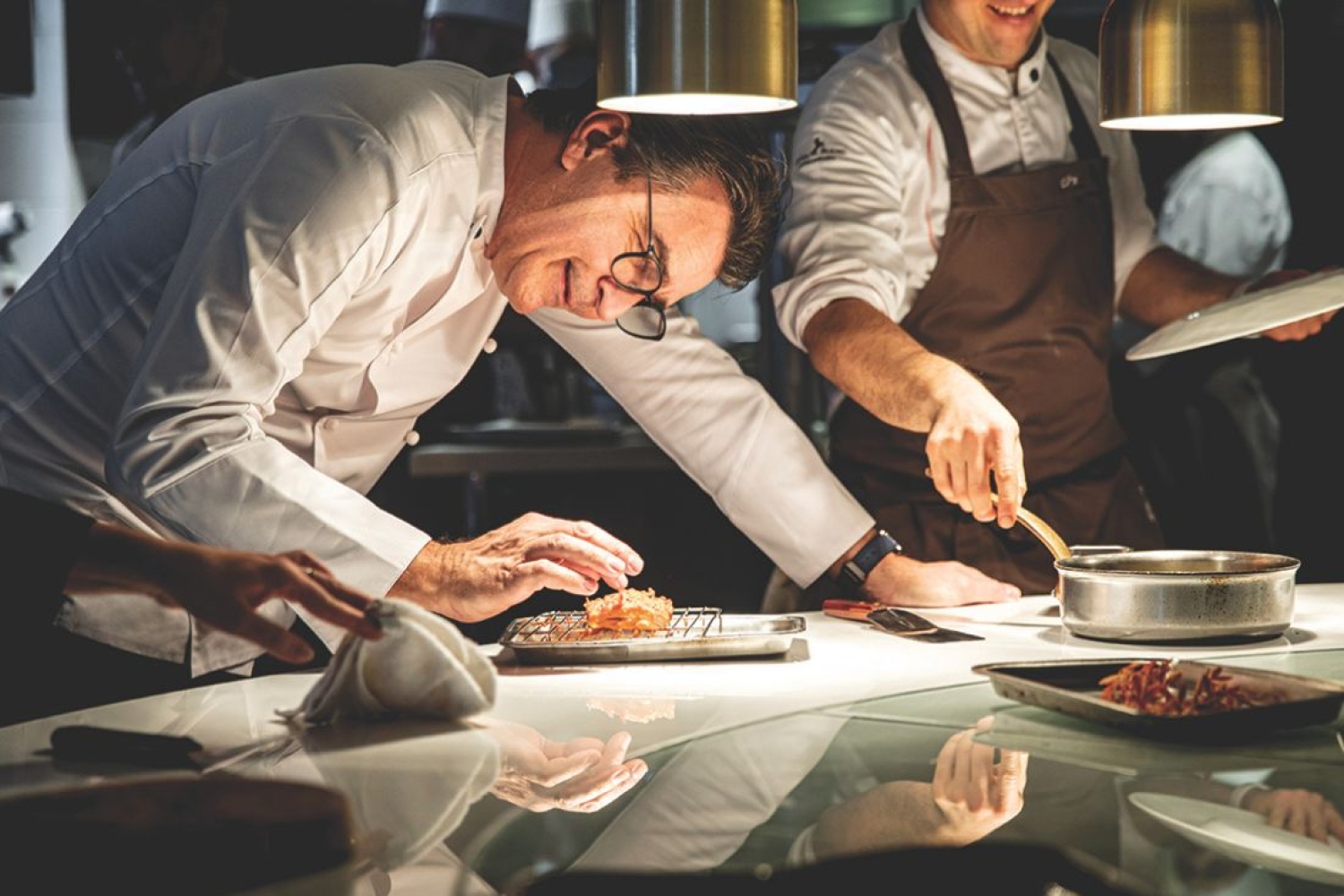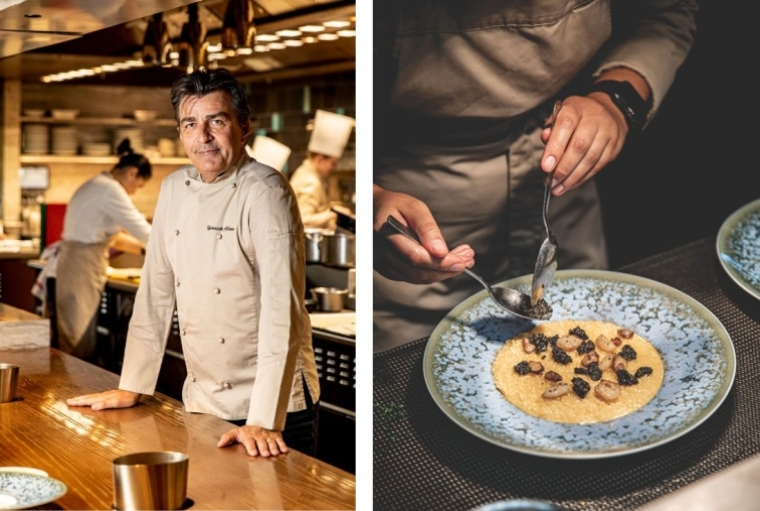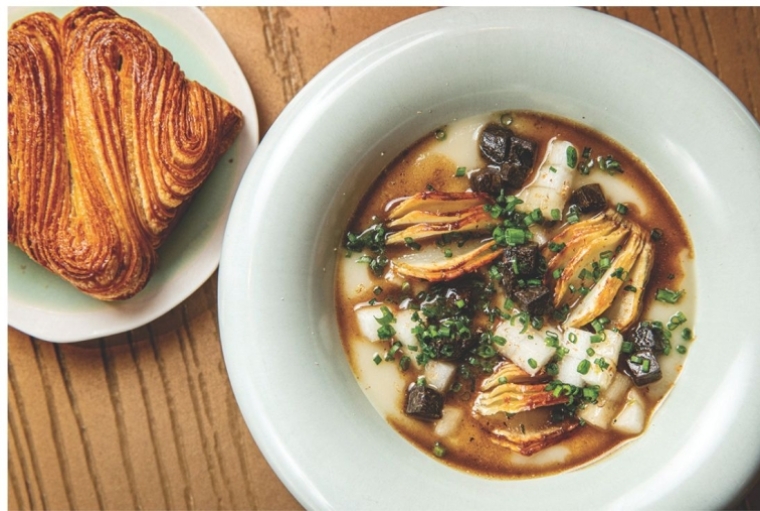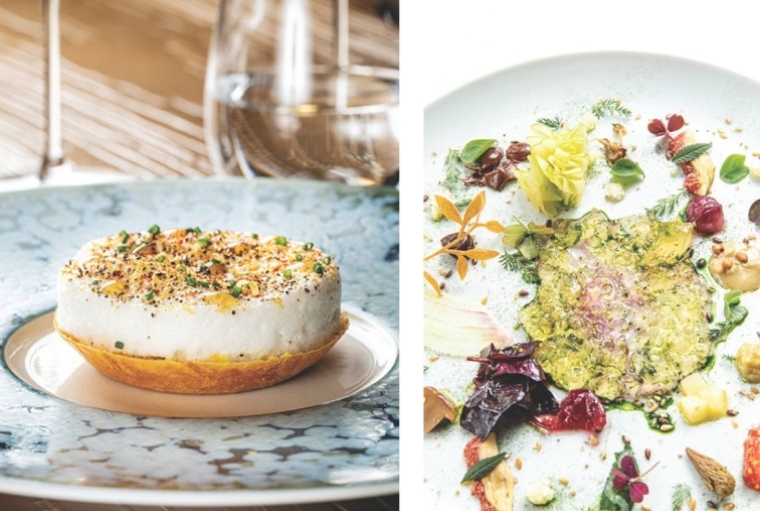
Yannick Alléno

Yannick Alléno
A warm sunny day in Paris and I am headed to The Pavillon Ledoyen for lunch. That in itself, would normally be enough to fill me with joy. It is a three star Michelin restaurant helmed by the incredible chef Yannick Alleno, set in the leafy park just off the Champs Elysees, next to the Seine, in a beautiful building resembling a greenhouse that has a long and multifaceted history. (Started as a small inn in 1779, restored as a restaurant, host to Robespierre and Loius de Saint-Just (just a few days before they headed to the guillotine during the French revolution) and a favourite haunt of artists like Degas, Monet and Flaubert).
Add to this the fact that just the night before, I had been dining with some close friends who happened to be journalists and upon hearing that I was to lunch at Yannick’srestaurant, launched into an enthusiastic homage to his food, his personality and most of all his amazing talent. I was, understandably, practically skipping with excitement. To tie it all together, I was to get the opportunity to speak to Yannick myself post my lunch, to talk of gastronomy, family, inspiration, local and international cuisine and his personal journey. As the French would say, Voila!
Entering the restaurant, flooded with natural light, the first thing one sees is the long, curved counter, facing the open kitchen. Soothing shades of sage, dove grey and baby blues, along with brass and wood accents set the stage for, with no hyperbole, what was one of the most memorable meals I have ever had.
I sat at the counter and course after course (there were eight) paired with wine, was served in beautiful hand thrown plates. The delicate balance of flavour, texture, presentation and unexpected ingredients made the entire experience a wonderful peek into what Yannick does so well and how it is different to the repertoire of other great culinary artists.

The kitchen is run by a team of brilliant young chefs, the almost performative dance that good kitchens get right, is on full display and it elevates the moment in a joyous way. There is nothing stuffy about any of this and in fact, despite the ‘fine dining’ moniker, I have heard the food described as comfort food and I wholeheartedly agree.
The secret to YA’s cuisine is multifold. One is his passion for the concept of ‘Terroir Parisien’, which celebrates the unique culinary heritage of Paris and its surrounding regions. He strongly believes that every locale has its distinct terroir (a term traditionally used to describe the environmental factors that influence the taste of wine). Alleno extends this simple concept to cuisine, emphasising the importance of local ingredients. Many chefs believe in this core concept but where YA occupies a distinctive space, lies in the belief that his restaurants cannot simply use local ingredients to re-create the same menu across his multiple restaurants around the world, but instead actually adapt his flavours and menus to be in harmony with the local produce. As his restaurants open globally (London, Dubai, Korea, Monaco ++) the menus and tastes fit the local market, enabling it to go back to the original idea of terroir.
Another is his signature technique of extraction. I speak to him about it at length in our chat but in brief: extracting and intensifying flavours employs advanced techniques such as cryo-concentration, a process that involves freezing and then thawing ingredients to concentrate their flavours. YA strongly believes in a dynamic approach to cooking that respects tradition while embracing innovation. The research and science that has gone into perfecting his flavours and sauces, is that magic that makes his cuisine so distinctive.
After a perfect lunch, we sit down to talk about the past, present and future.

Rymn Massand: Like all good stories, let’s start at the beginning. What sparked your interest in food?
Chef Yannick Alleno: I wanted to do that job since I was eight. My grandmama had thirteen children and in summer, when we went to the countryside, she wanted to have all the kids around. There were a lot of kids. Naturally, the older ones were asked to take care of the younger ones. My chaperone was my cousin Jean Marc, who was the chef in a little village bistro. Given he had to work and he couldn’t leave me alone-he would say, ‘Come with me, peel the potatoes’, and I would happily say, ‘Yes! I want to do the job’. I would watch Jean Marc: he had a very easy way with people. They loved him and wanted to be around him and there was a sensation that people were happy that he was there. I liked that, I wanted to have that too.
It is, I think, the key of what I want to do in my life. I never wake up in the morning and think oh! I’m tired. Never.
RM: Has this beginning in a small restaurant, watching the locals come in and feel at home, that familiarity, influenced your approach to your restaurants over the years?
YA: Pavillon is really done for the neighbourhood, people who live around. I think the idea is to create a bridge, between the food and the people. So, we try to keep the prices very reasonable and to be sure that people can enjoy the place every day for their own pleasure and say, ‘Ok, we come back tomorrow with the kids’. I love the proximity of people. Yesterday, I greeted everyone when I came in, these are regulars and locals who treat the restaurant like their neighbourhood spot. Now in London (Pavyllon London opened in 2023 in the Four Seasons Hotel, Park Lane) I know everyone the same. And the idea across all our restaurants, this emotion, stays the same.

RM: You have, of course, worked in some of the most prestigious and exciting kitchens in Paris and trained under some iconic chefs, tell us a little bit about those years.
YA: Enrolling in the Lycee Santos-Dumont in Saint-Cloud at the age of fifteen (the prestigious school offered him the opportunity to refine his skills) was a rigorous training but I loved every moment of it. The discipline, the techniques, the creativity—it was everything I wanted.
After which came those early years, my formative years, where I apprenticed with Gabriel Biscay at the Royal Monceau, Roland Durand at the Sofitel Porte de Sevres, followed by Martial Enguehard. However, it was at Drouant, under Louis Grondard, where I found my maturity and determination.
In 1999, I was appointed the head chef at the Scribe Hotel in Paris. Through innovation we quickly earned the restaurant two Michelin stars which was a dream but also just the beginning.
RM: Next was the fabled Le Meurice, your unique approach to French cuisine, creativity and meticulous attention to detail, quickly earned you a third Michelin star in 2007. How did that feel?
YA: Achieving that third star was an emotional moment, a validation of all the hard work and passion. I always aim to create an emotional connection with my guests through myfood and it was a confirmation.
RM: Over the years, has your approach to gastronomy changed?
YA: You have to feel food like art. When you buy a Fontana, it’s just a piece of cloth canvas and you cut it...Today you can have it for two to three million. It’s not the cost of thethings, it is the spirituality.
I think there are a few chefs in the world like that and I think I can be a part of them. I think the approach to food we have is different: there are two categories of chefs. One thinks about doing the job perfectly and the other one will try to find spiritual things about the food. For myself, I wanted a great evolution of food and when I found a way to create new sauces with extraction, I felt we had achieved something new.
Extraction is about putting the vegetables at the perfect temperature for the perfect time, which I then reduce to a liquid by freezing it, (a technique he has perfected) so there is no aggressivity in terms of fire.
When I open the door to summer time: a time when you have the most beautiful vegetables and fruits and want to create sauces that stay connected to nature and yet have a complexity, this is where the creation comes in.
This is an all exclusive excerpt from our Bookazine. To read the entire article, grab your copy here.
Words Rymn Massand
Photography SImon Detraz
Date 18.01.2025